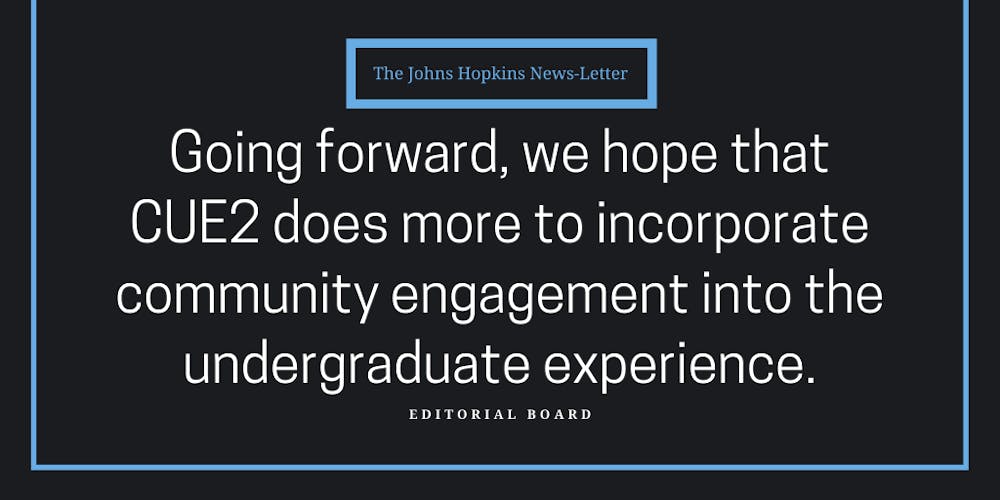Last week, the Second Commission on Undergraduate Education (CUE2) released a set of recommendations to revamp the undergraduate curriculum at Hopkins. These recommendations aim to improve the undergraduate experience, with an emphasis on student health and wellbeing.
It’s undeniable that academics have an impact on our mental health here at Hopkins. According to a 2018 report by the University’s Task Force on Student Mental Health and Well-being, 39.6 percent of students surveyed felt that their workload is “very stressful” – a higher percentage than at other Ivy League and peer universities. Improving mental health on campus will require broad, systemic change. We are hopeful that CUE2’s proposed improvements to the undergraduate curriculum will help alleviate some of the academic stress we all face.
One key CUE2 recommendation would make major requirements less stringent, allowing students to take more elective classes and pursue other interests. We believe that this change would be largely positive. Many STEM majors with rigid four-year curriculums, for example, stand to benefit from the opportunity to explore their other passions.
Another CUE2 recommendation seeks to standardize and improve the transparency of the University’s grading system. We are hopeful that this change will have a positive impact on student wellbeing. A standardized grading system could, for example, eliminate the potential role that professors’ biases play in evaluating student performance. Encouraging professors to set clear expectations and to allow students to monitor their grades throughout the semester will lessen student anxiety.
CUE2 also suggests having more faculty from the University’s other divisions teach undergraduate classes on the Homewood campus. This would allow students to learn from a wider range of experts in their respective fields.
However, while we are optimistic about most of the recommendations, we are wary that some may have unintended consequences. For example, the report recommends a required first-year seminar for freshmen. While this could be a good way to unify the freshman class, there is also the possibility that this would be an additional requirement that students struggle to fit into their schedules.
CUE2 also recommends giving students the option to pursue a “Hopkins Semester,” or a semester-long research project outside the classroom. We recognize that a Hopkins Semester could allow undergraduates to gain a deeper understanding of a subject of their choice; however, most majors already provide opportunities for similar undergraduate research projects. We are unsure how substantially the Hopkins Semester would change the student experience.
Additionally, we feel that the recommendations do not sufficiently address one important aspect of life at Hopkins. Going forward, we hope that CUE2 does more to incorporate community engagement into the undergraduate experience. We believe that if there is one thing Hopkins should be requiring of its students, it is that they make an effort to integrate themselves with Baltimore. All students could benefit from an experiential learning course. Several such courses, such as B’More Intersession classes and the Community Based Learning course in the Writing Seminars department, are already available. Why not create more? Adding a required Baltimore component to the student experience could be an invaluable addition to the four years we spend in the city.
Given the impact of the first Commission on Undergraduate Education (CUE1) in 2003, we believe that CUE2 has the potential to create tangible changes. Because CUE1 outlined plans to put Hopkins “in the top decile of its peer group in the enrollment of under-represented ethnic minority students,” the University created the Baltimore Scholars Program. Because CUE1 prioritized offering more student housing, Charles Commons was built in 2006. Because there were multiple recommendations to improve academics, Hopkins now provides smaller classes, including First Year Seminars for freshmen.
These additions were all welcome, and we’re glad that CUE1 outlined problems that led to genuine solutions. We note, however, that not all CUE1 plans came to fruition. CUE1 stated that it would create University housing for all undergrads within 10 years. Seventeen years later, this has not happened. CUE1 also advised against the creation of a central student hub like a Student Center, which the University is now pushing forward. We recognize that plans change over time, but encourage students to note that the CUE2 proposals are recommendations, not promises.
Despite these concerns, we genuinely believe that CUE2 made its proposals with student wellbeing in mind. It has taken several years of planning, starting in April 2017. Since then, students have been directly involved in the process. Not only were undergrads part of a CUE2 focus group, but they were also encouraged to email suggestions and were invited to CUE2 “coffee chats” with the co-chairs of the commission.
We are glad that Hopkins is following in the footsteps of other institutions when it comes to reshaping the undergraduate curriculum. In 2017 and 2018, Hopkins hosted nearly a dozen faculty members from other universities to discuss the benefits of similar endeavors at their institutions, and we appreciate the years of effort that went into this research.
The plans outlined in CUE2 are beneficial, and we’re glad that Hopkins is aware of the parts of the curriculum that could use change. We’re especially grateful that they are continually allowing us to contribute to this conversation. We appreciate that a feedback form is available online, and that the draft is easy to comprehend. Now, it is up to us as students to step up and provide feedback.
Overall, we look forward to seeing what positive changes CUE2 will bring. The plans that Hopkins outlines, and their reasons for introducing these changes, are well-intentioned. Hopkins has a chance to build on the successes of CUE1. We hope that it rises to the occasion.





